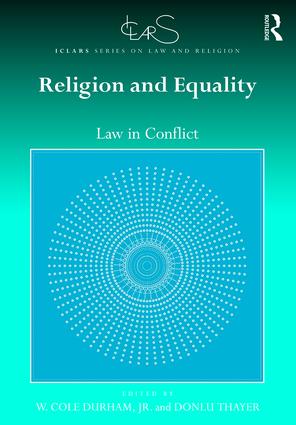





The publishers have announced the June 2016 release of Religion and Equality: Law in Conflict, edited by International Center of Law and Religions Studies (ICLRS) Founding Director W. Cole Durham, Jr. and ICLRS Senior Editor Donlu D. Thayer. This long-awaited book is first title in the new ICLARS Series in Law and Religion, published by Routledge, an imprint of the Taylor & Francis Group. Professor Durham, in addition to his role at ICLRS, is second and current President of ICLARS, the International Consortium for Law and Religion Studies, headquartered in Milan, Italy. The ICLARS Series will officially launch at the Fourth ICLARS Conference, to be held in Oxford, UK, in September 2016.
Religion and Equality is the first of two books with origins in the Third ICLARS Conference, held in Virginia in August 2013. A second volume from this conference, Religion, Pluralism, and Reconciling Difference, also edited by Durham and Thayer and also part of the ICLARS Series, is scheduled to appear later this year.
Religion and Equality presents an analysis of controversial events and issues shaping a rapidly changing international legal, political, and social landscape. Leading scholars and experts in law, religious studies and international relations, thoughtfully consider issues and tensions arising in contemporary debates over religion and equality in many parts of the world. The book is in two parts. The first section focuses on the anti-discrimination dimension of religious freedom norms, examining the developing law on equality and human rights and how it operates at international and national levels. The second section provides a series of case studies exploring the contemporary issue of same-sex marriage and how it affects religious groups and believers. This collection will be of interest to academics and scholars of law, religious studies, political science, and sociology, as well as policymakers and legal practitioners.
Pre-Publication Reviews:
'This volume provides a useful set of insights for both scholars and practitioners into one of the most significant and complex issues in modern human rights law. The chapters are written by leading experts from a range of jurisdictions and include a focus in the second part on same-sex marriage issues.’
Carolyn Evans, The University of Melbourne, Australia
'Discriminating to fight discrimination? By addressing the "clash of rights" produced by the rise of an equalitarian paradigm, this study suggests diversity-friendly solutions as to how religious freedom and equality rights can be reconciled in the contemporary world, offering a holistic or integralist view of the legal system. It particularly appeals to scholars committed to the pursuit of reconciliation between apparently opposed rights and liberties.'
Carmen Asiain Pereira, University of Montevideo, Uruguay, and President of the Latin American Consortium for Freedom of Religion or Belief
'This first volume of the new ICLARS series provides us with a fascinating debate on religion-as-equality instead of religion-as-liberty. This major turning point is deeply analysed through a rich comparative legal analysis, not only in a geographical and transcontinental way but also cross-thematical. What results is a really inspiring elucidation between equality among religions on the one hand and the various religious conceptions of equality on the other.'
Louis-Léon Christians, Université catholique de Louvain, Belgium
'Durham and Thayer invite us in to where religious diversity is not the problem but rather is the human condition. The book points the way forward, which entails not moral agreement or even mutual civility but a commitment to the civilizing rule that neither religion nor equality enlist the power of the state to get the other to renounce core beliefs or act contrary to them. The collection goes beyond mere description, getting down to solutions where the liberty claims of the religious are weighed against countervailing claims, such as those of our LGBT communities.'
Carl H. Esbeck, University of Missouri, USA
